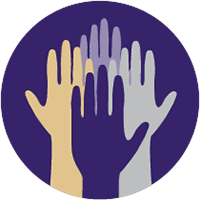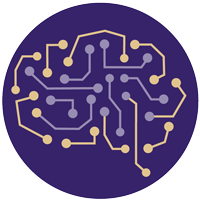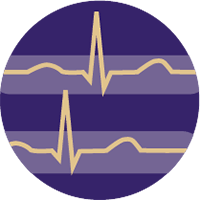Information to Impact: Grand Challenges
In facing the challenges articulated below, we draw upon a range of disciplines that focus on how people create, use, store, share, and communicate information. Our faculty and students are drawn together in this work because of the problems they want to solve, and a recognition that it takes the widest range of knowledge and skills to do so.
 A healthier planet
A healthier planet
Research and education are desperately needed to address issues of climate change, mass deforestation, global warming, rising carbon emissions, more frequent and extreme storms, and melting arctic ice. This is especially true in our information and knowledge society and in our fight against misinformation and disinformation. The Information School is investing in activities that will lead to a broader understanding of these changes, and go further — to contribute research expertise in crisis and disaster informatics, community science, participatory eco-data management, environmental studies and data, and climate and Indigenous knowledge.
By investing in this strategic focus, we can complement and bolster the work going on in value sensitive design, digital literacy, data curation and participatory design. Further, it will allow the school to build partnerships with other academic units, institutions and government initiatives by infusing an information lens on the work of environmental science, public policy and intergovernmental affairs. We believe there is a considerable contribution to be made by students and researchers from the Information School to these critically important, yet complex, issues. We see a world better off because of information education and information research.
 A stronger democracy & a more informed public
A stronger democracy & a more informed public
Trust in our public institutions and democracy is plummeting. Information is the core component for a healthy democracy. Few things are more important than battling misinformation and disinformation as it relates to public office, voting and providing access to information. With the founding of the Center for an Informed Public and the ongoing work of the Tech Policy Lab, we, with other units, have taken the lead on research on deep fakes, data policy work, and human flourishing through a better understanding of the interdependence of people, information, and the institutions supporting the advancement of technology in society.
The Information School’s heritage in librarianship has been a compass guiding the continued evolution of thought and learning in this space. With the unprecedented growth of embedded technology and information decisions that shape policy, governance, privacy and access, we have and will continue to contribute to knowledge of this new reality. With this area of strategic visibility, we will invest in research and teaching on misinformation and disinformation, public libraries, civic tech and civic media, open data, and e-government. Our commitment to building a better democracy and a more informed public will be a signature of our work at the Information School.
 Responsible AI
Responsible AI
As the world moves increasingly into the age of AI, iSchool research has kept pace, working to understand and explicate ethical and fairness issues with artificial intelligence systems and to develop value-sensitive, human-centric solutions. In addition to research focused on the systems themselves, numerous centers and labs study the many applications of AI that have become commonplace in our professional and personal lives.
Our teaching practice embraces AI, seeking to impart students with the skills to lead AI initiatives and leverage this rapidly developing technology responsibly to support our shared vision of a world where effective use of information helps everyone discover, learn, innovate, solve problems and have fun.
 Healthier, happier people
Healthier, happier people
Even before the worldwide pandemic, Information School research and teaching pointed to the importance of information for our health and well-being. From designing better patient records in the context of the internet of things, to visualizing variables in health indicators to inform decision-makers about population health, we see health and well-being through information lenses — asking what information problems surface that we can help solve through our work in the information field.
Our work in health informatics, libraries and trauma, digital youth, technology and social change, and data ethics points to the growing expertise we want to expand. We see ourselves leading in novel approaches to bettering health and well-being through information research at the individual, organization and population level.
